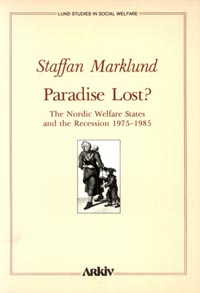Paradise Lost?
The Nordic Welfare States and the Recession 1975–1985
In the late 1970’s a ’welfare crisis’ hit most of the Western world. Economic problems such as trade imbalances, public deficits and decreasing productivity were seen as signs of a more definite recession. In most nations there was also a marked political shift to the right. Both these factors created an unfavourable climate for public welfare.
In this study the four Nordic nations Denmark, Finland, Norway and Sweden are compared. They constitute a group of nations with well developed welfare programmes and they were all in different ways affected by the recession. To what extent are their welfare systems capable to survive economic and political threats?
The study shows that endogeneous factors such as degree of universalism, financial arrangements, popular support and work efforts seem to be more important than economics or politics to explain variations in stability of the welfare state.
Staffan Marklund is Reader in Sociology and Social Policy at the University of Umeå, Sweden.


